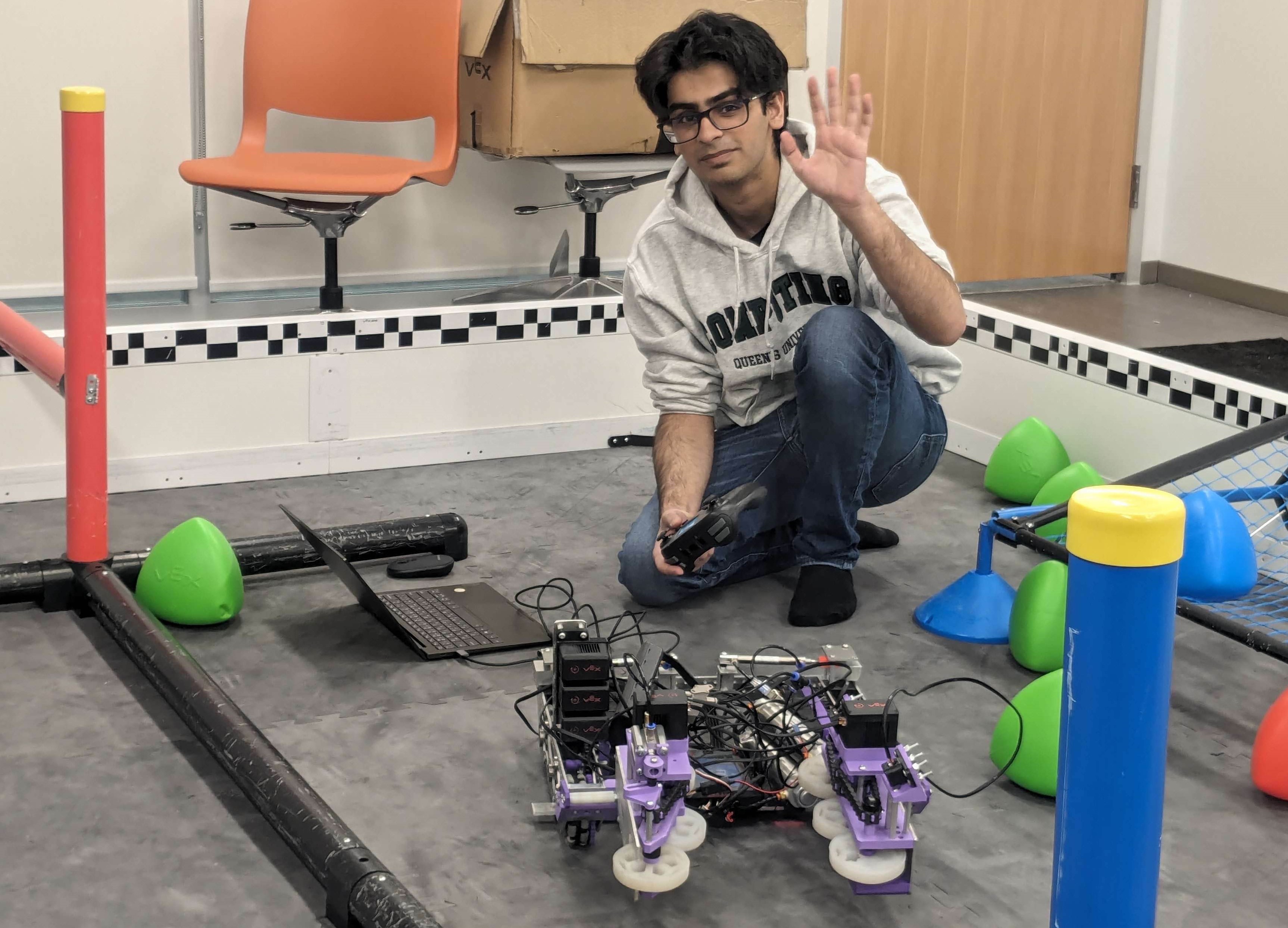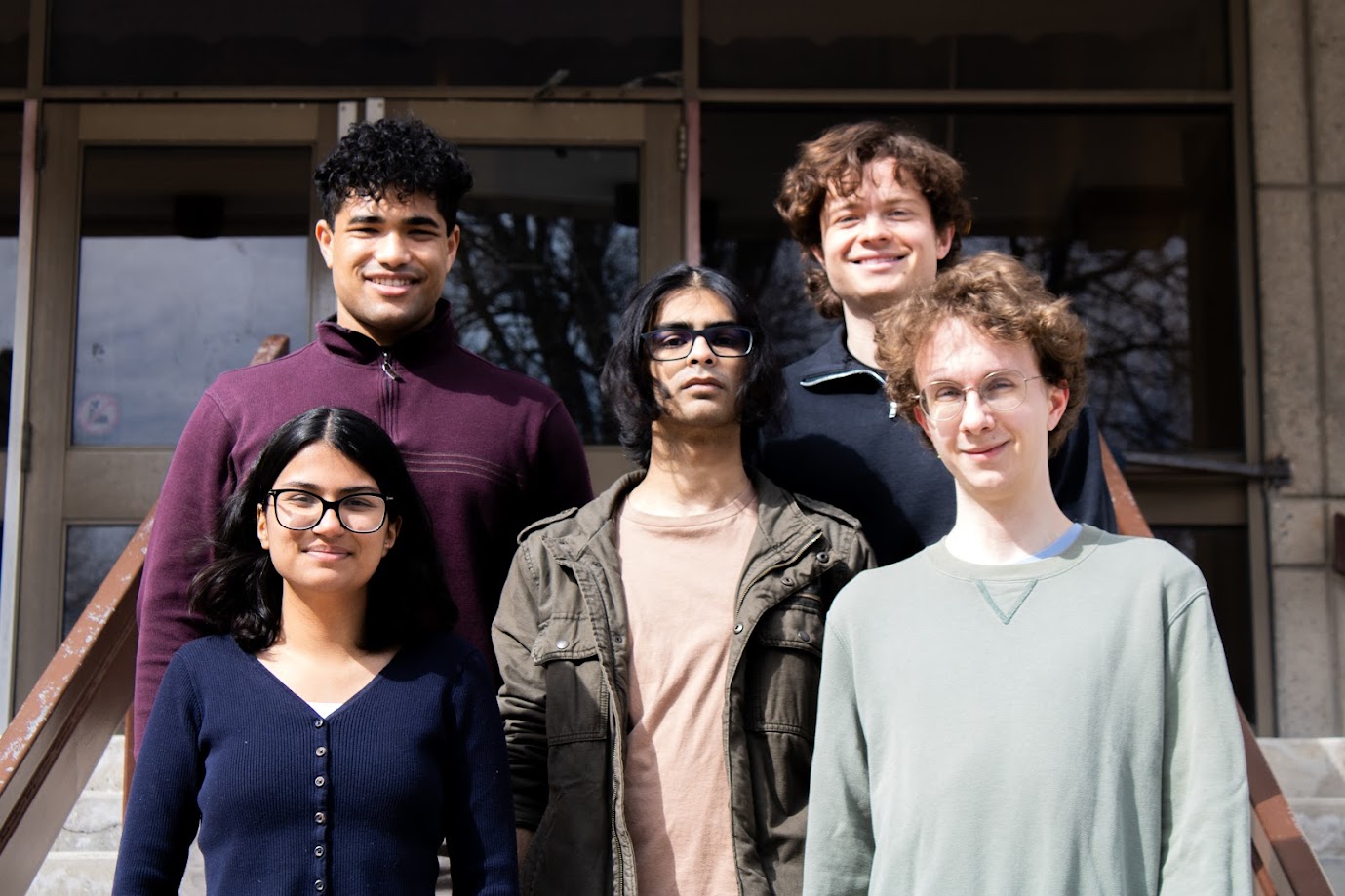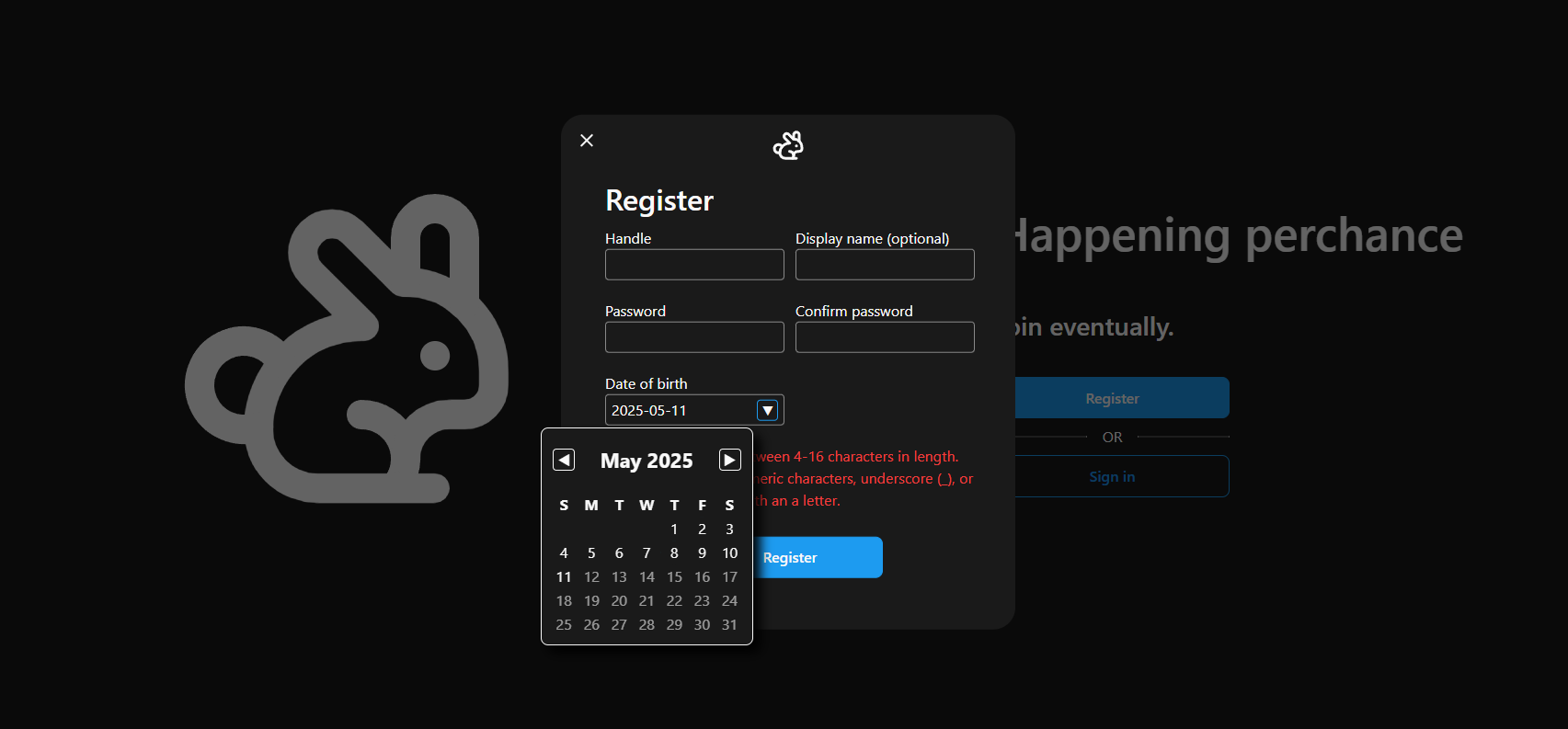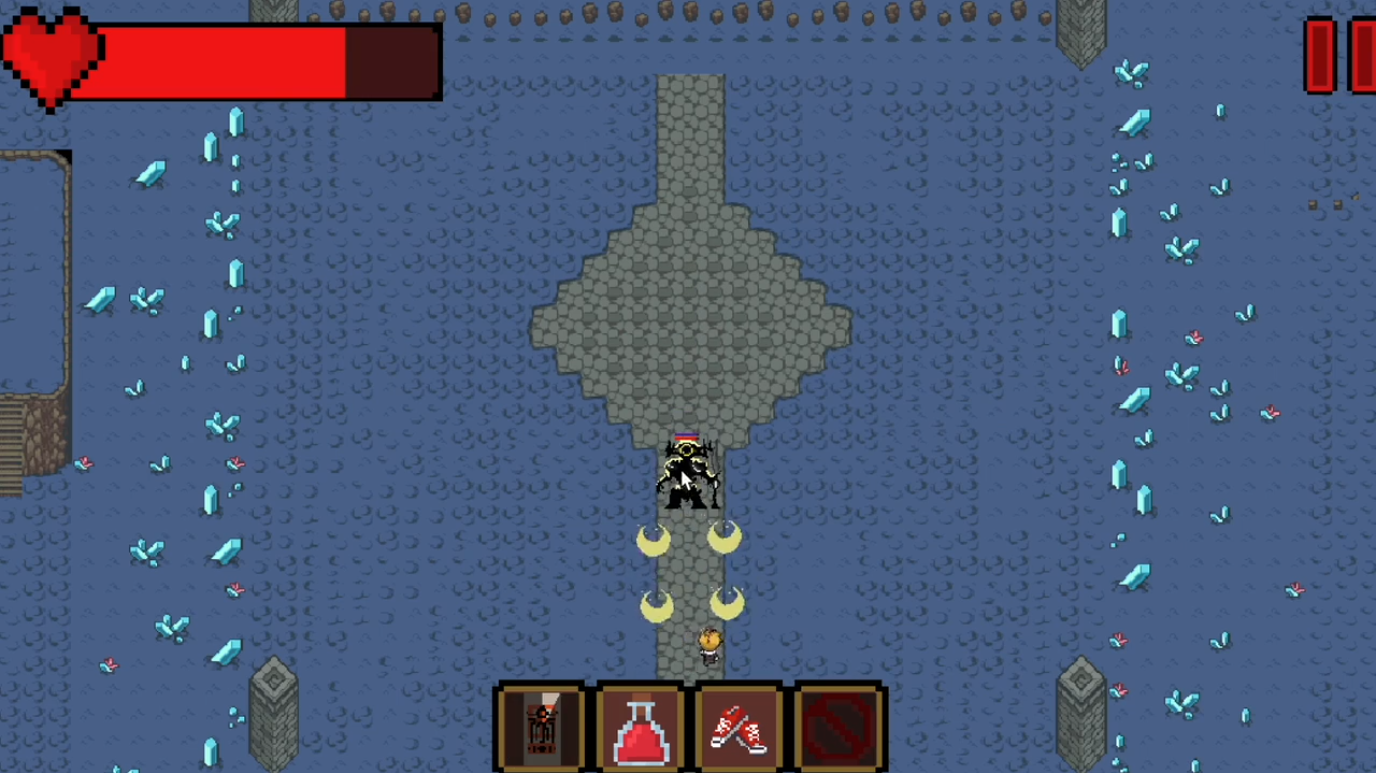
Kashan Rauf
4th year student
Queen's University
About Me
Hi, thanks for visiting my website! I recently finished my 3rd year of study in computing at Queen's University. I'm a passionate member of the computing community and I've been involved in multiple clubs including QVEX- one of Canada's most innovative and highly ranked VEX U Robotics teams- as a software and electrical team member. I was also the internal affairs coordinator of COMPSA, where I worked with other people within and outside of the organization to run elections and hold internal events, as well as updating policies and manuals that members of the organization follow.
I'm currently away from university to pursue a 12-month internship with Ericsson.
I am:
Interests
- Automation & Robotics
- Software Engineering
- Web Development
- Computer Networks
- Language Processing
Education
- B.Sc. (Hons) of Computing @ Queen's University
- Diploma Program @ International Baccalaureate
Experience
RAN Troubleshooting Tech Support Co-Op
Sep. 2025 - Present
Ericsson
- Applied SW troubleshooting methodologies across RAN infrastructure.
- Collaborated with a team to analyze and investigate customer issues.
- Performing fault reproduction and handling configurations in applying RAN SW architecture and 3GPP.
- Operation and maintenance of SW/HW configurations.
- Implementation of AI and Machine Learning solutions to enhance uptime and effectiveness.
Extracurricular
Software & Electrical Team Member
Oct. 2023 - Present
Queen's VEX U Robotics Team
- As a member of QVEX, I've had the chance to work with and learn from many talented peers and contribute to innovative, game-changing solutions to design problems faced by VEX Robotics teams.
- Encapsulated and integrated complex hardware subsystems to enable autonomous programming with real-time systems and remote control of robots for use in testing components and competitions.
- Designing and testing custom electronics and embedded systems, enabling support for innovative solutions using computer vision and Lidar-based GNC used by sophisticated autonomous routines.
- Used Rust to develop and document modules for the team's robot programming library, which enabled wireless communication between robots using radio components.

Administrative Coordinator
Oct. 2024 - May 2025
Computing Students' Association
- Joining COMPSA was my way of giving back to the amazing community that makes the Computing faculty at Queen's special. I had the chance to work with other students of all years, as well as organizations outside of Computing such as the HSS and AMS to organize events and make decisions that enhance the student life at Queen's.
- Tasked with overseeing the internal affairs of the organization and ensure proceedings run smoothly during council meetings and general assembly where decisions impacting over 1000 students are made.
- Ensure that constitution and policies align with organization/school values and incorporating them into activities and initiatives.
- Planning COMPSA council elections for executives and directors by gathering nominations, overseeing campaigning periods, and managing polls. Successfully coordinated with other organizations to execute, while working with marketing team to achieve a voter turnout of over 450 eligible students.

Personal Projects
Twitter Recreation
Java, Maven, Spring Boot, Spring Security, JavaScript, ReactJS, MySQL, JWT
- The aim of this project is to recreate X (formerly Twitter) using technologies and skills I had been working on in smaller-scale projects. It is currently a work in progress but substantial progress has been made.
- My intention is not to copy every feature, but to make a web app with a very similar premise. I do not intend to implement every feature that X has, but to focus on major functionalities and original features not seen in X.
- Implements the Spring Boot/Security architectures to handle requests such as stateless authentication/registration and interaction with users and posts through secure REST APIs.
- The React-powered frontend mimics the original's to a degree, and it enables the intended user experiences- whether it be recreated or original.
- The unique features aim to emphasize internet subcultures and styles of communication that Gen Z is familiar with. One such example is the emote system, which allows for non-standard emoticons that align with references, ideas, and humour that Gen Z is familiar with.

Flight Booking System
Python, Flask, PyTest, MongoDB Atlas, HTML/CSS, Selenium
- A group project I worked on with 2 others for a course: CISC 327 (Software Quality Assurance).
- The intention of the project is to give students the opportunity to work together in an agile, iterative development style to develop a piece of software complete with unit, integration, and coverage tests.
- The Flask frontend interacts with the Python backend to fetch/send data about users, available flights, and bookings to/from the NoSQL database.
Book Catalogue
JavaScript, MongoDB, ExpressJS, React, NodeJS, Vite
- A react web app using the MERN stack, users can create, view, edit, and delete books.
- The frontend is modular and flexible since it is composed of several components designed for reusability.
- Uses a RESTful web API to allow users to interact with the system.
Realm of Ruins (Unity Game)
Unity, C#
- Developed from scratch with the effort of myself and 3 others. Planning, design, and development took place over the course of 3 months as an exhibit for the Queen's 2024 Creative Computing Showcase.
- Managed the development process and coordinated meetings and timelines to stay ahead of deadlines and ensure quality and polish.
- My main task was programming all mechanics and behaviors, as well as making item and projectile sprites.

Jetson Carrier Board
Electrical Engineering, Hardware Debugging, PCB Design, STM32, I2C, PCIe
- Solved a critical error in a previous model by reviewing schematics and hardware debugging techniques.
- Redesigned various aspects of the previous iteration for compatibility with the Jetson Orin Nano (previously supported the Jetson Nano), including power delivery and sequencing.
- Implementing support for I2C cameras and LiDar modules used for computer vision and localization.
- Separate "debugging board" for examining input and output data from Jetson using USB and Ethernet.
Coursework
Courses that taught relevant skills/experiences only. Electives not related to the field are not included.
Winter 2025 (Third year)
CISC 458- Programming Language Processors
- Introduction to the systematic construction of a compiler.
- Grammars and languages, scanners, top-down and bottom-up parsing, runtime organization, symbol tables, internal representations; Polish notation, syntax trees, semantic routines, storage allocation, code generation, interpreters.
CISC 365- Algorithms I
- Principles of design, analysis and implementation of efficient algorithms. Case studies from a variety of areas illustrate algorithmic paradigms.
- Divide and conquer methods, the greedy approach, branch and bound algorithms and dynamic programming.
CISC 352- Artificial Intelligence
- An introduction to the basic principles and tools of artificial intelligence. Problem solving methods and knowledge representation techniques.
- Applying the intelligent agent paradigm as an underlying model for exploring AI problem domains, tools, and techniques.
- Intelligent agents. Search. Constraint satisfaction. Planning/automated planning. Bayesian networks. Probabilistic reasoning. Machine learning and deep learning.
CISC 332- Database Management Systems
- Data models: relational, entity-relationship. Relational query languages: relational algebra and SQL. Relational database design.
- Application interfaces and embedded SQL. Storage and indexing.
Fall 2025 (Third year)
CISC 360- Programming Paradigms
- Review of imperatives programming features. Introduction to other widely used programming paradigms. Functional programming languages, such as LISP and Haskell. Higher order functions, lazy evaluation, abstract and recursive types, structural induction, symbolic expressions.
- Logic programming languages, such as PROLOG. Operational interpretation of predicates and terms, proof search, unification, backtracking. Typical applications.
CISC 327- Software Quality Assurance
- Validation of software throughout the life cycle.
- Comparative effectiveness in defect removal of formal methods (proofs of correctness), inspection (walkthroughs and reviews), and testing (unit, integration, and system testing; white box versus black box).
CISC 324- Operating Systems
- Layered operating systems for conventional shared memory computers: concurrent processes.
- Synchronization and communication. Concurrent algorithms. Scheduling. Deadlock. Memory management. Protection. File systems. Device management. Typical layers.
CISC 322- Software Architecture
- Abstractions and patterns of interactions and relationships among modules. Design recovery; relationship of architecture to requirements and testing.
- Students in groups of 5-6 analyze an open source repository in 3 stages: theoretical implementation, actual implementation, and improvement.
Winter 2024 (Second year)
CISC 235- Data Structures
- Design and implementation of advanced data structures and related algorithms, including correctness and complexity analysis.
- Tradeoffs among alternative implementations of a module interface.
CISC 226- Game Design
- An introduction to techniques for designing elementary computer games.
- Topics included game development tools and processes, principles of game design, game prototyping and game evaluation.
- Students undertook a final project (in teams of 4-5) to make a Unity game by applying the topics they have studied.
CISC 223- Software Specifications
- Introduction to techniques for specifying the behaviour of software, with applications of these techniques to design, verification and construction of software.
- Logic-based techniques such as loop invariants and class invariants. Automata and grammar-based techniques, with applications to scanners, parsers, user-interface dialogs and embedded systems. Computability issues in software specifications.
CISC 220- System Level programming
- Basic concepts of Unix-like systems. Shells and scripting. System-level programming in the C language. Software development tools and techniques.
COGS 100- Intro to Cognitive Science
- A multidisciplinary approach to the study of the mind combining approached from philosophy, psychology, linguistics, neuroscience, anthropology, and artificial intelligence.
- Logic, rules, concepts, and other mental representations used to generate thought and behaviour. Implementation of computational and cognitive models of mental processes.
Fall 2023 (Second year)
CISC 221- Computer Architecture
- The descriptive levels of computer architecture. Instruction-set architectures, assembly, data representation.
- Support for operating-system management and high-level languages. Input/output and interrupts. Designing for performance. Digital logic.
CISC 204- Logic for Computing Science
- Elements of mathematical logic with computing applications.
- Formal proof systems for propositional and predicate logic. Interpretations, validity, and satisfiability. Introduction to soundness, completeness and decidability.
CISC 203- Discrete Math for Computing II
- Advanced proof methods for discrete structures from an object-oriented perspective.
- Combinatorics: advanced counting methods. Solving and applying recurrence relations. Graph theory including graph algorithms, structural induction, and proofs.
STAT 263- Introduction to Statistics
- A basic course in statistical methods with the necessary probability included.
- Topics include probability models, random variables, distributions, estimation, hypothesis testing, elementary nonparametric methods.
Winter 2023 (First year)
CISC 124- Intro to Computing Science II
- Introduction to software design and development with the object-oriented paradigm, and its effect on abstraction and component re-use.
- Working in groups using incremental development and version management. Test driven development. Numerical computation.
MATH 121B- Differential & Integral Calculus
- Continuation of MATH 121A.
MATH 111B- Linear Algebra
- Continuation of MATH 111A.
Fall 2022 (First year)
CISC 121- Intro to Compuuting Science I
- Introduction to design, analysis, and implementation of algorithms using Python.
- Recursion, backtracking, and exits. Linear data structures (stacks and queues). Elementary searching and sorting. Order-of-magnitude complexity. Documentation, iterative program development, translating natural language to code, testing and debugging.
CISC 102- Discrete Math for Computing I
- Introduction to mathematical discourse and proof methods with a focus on discrete structures.
- Sets, sequences, and relations. Properties of the integers. Induction. Counting with permutations and combinations, pigeonhole principle. Principle of Inclusion-exclusion. Introduction to graphs and graph terminology.
MATH 121A- Differential & Integral Calculus
- Differentiation and integration with applications to biology, physics, chemistry, economics, and social sciences.
- Topics included differential equations, multivariable differential calculus.
MATH 111A- Linear Algebra
- An introduction to matrices and linear algebra. Emphasis on applications to biological and economic systems and to computer applications.
- Topics covered included systems of equations, eigenvalues, recursions, orthogonality, regression analysis, and geometric transformations.